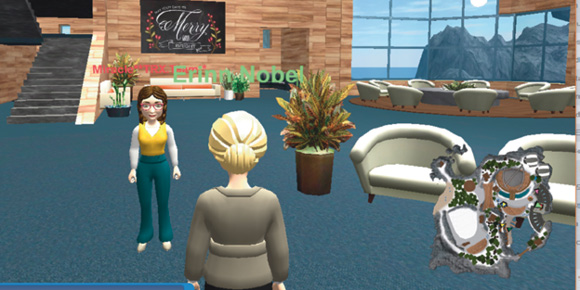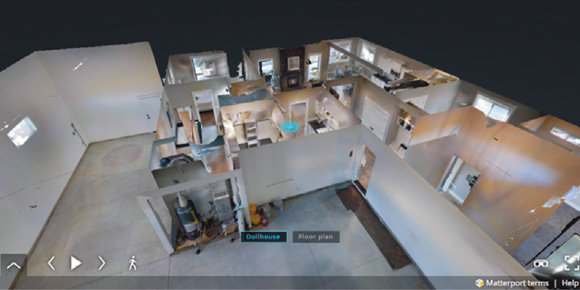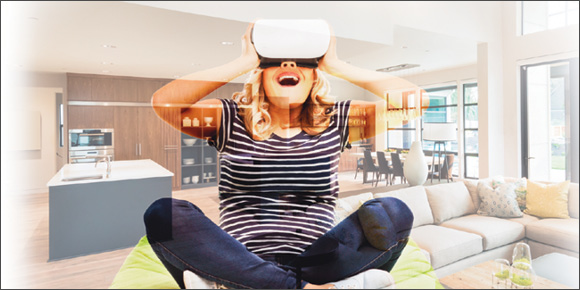Agents use advanced technology to give buyers a view into the future.
By Megan Craig
Like most REALTORS®, Erinn Nobel, CRS, a broker with eXp Realty in Bellingham, Washington, attends classes, strategizes, conducts meetings and networks with fellow brokers. Unlike many REALTORS®, she does so as an avatar in a cloud office environment—a virtual campus that allows her to collaborate with others across the nation without leaving her home office.
In the virtual campus, Nobel is able to communicate live, in real time, with other professionals and clients. Each person using the virtual space wears a headset or earbuds and has a microphone, and is represented in the virtual space by a virtual person known as an avatar. Nobel’s avatar interacts with the other avatars in the space, which offers casual meeting areas with beach chairs for the avatars, meeting pods for private communication, group meeting areas, an auditorium for large-scale meetings and private offices for various uses. It’s a computer representation of a space that could exist in real life, with virtual representations of the people who would use the space in real life.
 Erinn Nobel, CRS, conducts business with the use of an avatar in a virtual office space. The space was created in collaboration with VirBela.
Erinn Nobel, CRS, conducts business with the use of an avatar in a virtual office space. The space was created in collaboration with VirBela.
“I want to be on the forefront of technology,” says Nobel, explaining why she left a more traditional bricks-and-mortar brokerage office after 16 years. In addition to conducting client meetings in her virtual office, she meets with support staff for transaction management, agent support, tech support, broker support and more, all within the virtual campus.
Nobel is one of several agents across the country turning to virtual reality to advance her real estate business, both by using a virtual office space and by using 3-D camera technology to showcase her listings. Through these virtual tours, potential buyers can better understand floor plans, lighting, colors and possible furniture layouts without having to tour a home in person, which saves time for both the buyer and the agent.
How VR Helps Sell More than Homes
Jim Paulson, CRS, an owner/broker with Progressive Realty Corporation in Boise, Idaho, discovered the possibilities of virtual reality when he tested VR goggles at a trade show during a National Association of REALTORS® meeting in 2014.
“When I saw how incredible it was to virtually walk through a home while sitting on a bar stool—without your feet even touching the floor—I knew this was something I had to incorporate into my marketing plans,” Paulson says.
Now, he uses VR in several aspects of his business. He offers 360-degree virtual tours on YouTube, his blog and his websites. He takes still shots of the homes’ interiors via the virtual tours by choosing the exact position he wants to capture, then taking a screenshot. (The images are so high in quality that he uses them on yard signs, flyers and in the MLS.) Paulson is even able to create a custom walk-through, setting the path so the potential buyer doesn’t need VR goggles, a keyboard or a mouse to tour the home.
But it’s not just the homes Paulson is selling with his new technology—it’s his services. The interactive tours “demonstrate how much further I am going than my competitors,” he says.
“During a listing presentation, I pull out my VR goggles with one of my tours and have them visualize what I do firsthand,” he says. “Listing competition over!”

Showcasing 3-D listings, using a service like Matterport (shown), saves time for REALTORS® and buyers.
Making VR a Reality for All REALTORS®
Especially in areas with many out-of-town buyers, virtual listings can mean the difference between selling a house and sitting on an unsold property for months.
The technology is available to those who can afford it—for now, mostly REALTORS® who sell high-end, high-dollar properties and have large sales and marketing budgets. But some agents, like Paulson, are adding VR to their marketing priority lists despite the high price tag.
For Paulson, the technology is “a game-changer.” He started by buying a Samsung smartphone and complementary Samsung Gear VR goggles (the goggles are available for about $99), then found a local company that used a camera made by industry-leading VR equipment-maker Matterport.
Matterport was the company that had given Paulson his first taste of VR at the trade show. The company’s equipment allows for total space reconstruction, says Matt Bell, Matterport’s co-founder.
Major property portals, like realestate.com in Australia, are building in VR property portals that allow people to browse thousands of properties in virtual reality, and others, like apartments.com, link to the VR versions of spaces from their mobile websites.
And for those who don’t use VR goggles yet, 3-D spaces that allow “a good amount of immersion” can be navigated via laptop, tablet or phone using Matterport’s web viewer, Bell says.
Thanks to a price incentive at the NAR trade show this year, Paulson now is the proud owner of a Matterport VR camera (available for $4,500), allowing him to create his own setup “so I could push the limits without having to pull my competition along,” he says.
Looking to the Future
Although the use of virtual reality for REALTORS® is a relatively new idea, Erinn Nobel, CRS, a broker in Bellingham, Washington, sees it becoming a huge part of the profession in the next several years.
“I think VR will become an essential tool to reach a broad audience of buyers across the globe,” she says. “VR will also become an essential tool for brokers and agents to work and collaborate together without ever leaving the home office.”
Jim Paulson, CRS, a broker in Boise, Idaho, already uses the technology in his agency, but thinks it will be a while before high-end VR goggles hit mainstream status. In the meantime, he thinks more real estate offices and builders will begin to have the equipment ready for potential customers to use in their offices.
“Wouldn’t you rather do a virtual walk-through with a builder than just have them sit in front of you with a set of blueprints explaining what the house ‘should’ look like?” Paulson says.
As VR headsets become cheaper, the business will likewise adapt to evolving technology, says Matt Bell, co-founder of VR camera-maker Matterport.
That means all major property portals will have VR apps or other VR integrations; buyers will use VR to visualize how they would furnish a space they’re looking to purchase; and even buyers will use VR to make their actual, final purchase decisions. “I think we’ll start to see much more of what we’re already seeing,” Bell says.
Look for our new webinar about how you can use VR and 3-D Matterport technology in your business, happening May 9.








